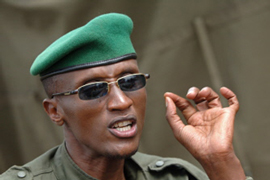EU envoys seek end to DR Congo war
European ministers call for political solution to conflict in east of the country.

Rwanda talks
On Saturday, the two European leaders, acting as EU envoys, held talks with Paul Kagame, Rwanda’s president, as part of efforts to end fighting across the border.
Rwanda has been accused of aiding the CNDP in its advance on Nord-Kivu, a claim rejected by Kigali.
The envoys discussed plans for Kagame to meet Joseph Kabila, his DR Congo counterpart, a Rwandan official said.
| Your Views |
|
How should the UN respond to the escalating violence in Democratic Republic of Congo? |
Bernard Membe, Tanzania’s foreign minister, said it was hoped that an emergency regional summit would be held Nairobi next week to discuss the crisis.
Kouchner and Miliband had earlier toured Goma, capital of DR Congo’s Nord-Kivu province, which is surrounded by CNDP fighters.
“The humanitarian need is absolutely pressing,” Miliband said in Goma.
“Humanitarian aid needs security and that is the absolute priority for these people [aid workers] who need safe and secure routes for the humanitarian aid that has been promised.”
Mohammed Adow, Al Jazeera’s correspondent in Kigali, said aid workers decribe the humanitarian situation in Congo as “catastrophic”.
“Most urgently, humanitarian organisations are expressing fears for about 50,000 people who have been forced to flee from the camps where they had fled to,” he said.
“The [UN and aid agencies] are accusing the rebels of forcing people out [of the camps]. People are scared to return home and are heading into the bushes. Relief agencies say these people have no food, water or shelter.”
‘Volatile situation’
An estimated one million people have been forced to flee their homes in Nord-Kivu by fighting over the last two years and the rebels have been accused of looting and burning refugee camps.
Pierre-Emanuel Ducruet, a spokesman from the International Committee of the Red Cross [ICRC], said: “The situation is very volatile and it is difficult for our teams of the ICRC or any other humanitarian organisation to reach people.
“We need people on the ground for distribution [of aid] and to make assessments.”
On Saturday, Miliband and Kouchner played down the possibility of a EU force being deployed in DR Congo.
They said that the 850 peacekeepers in Goma should be reinforced by the redployment of some of the 17,000-strong UN force that is already in DR Congo.
The UN force is all that stands between the city and the CNDP of Laurent Nkunda, a renegade general who says he is fighting to protect the region’s ethnic Tutsis.
Nkunda’s forces, who declared a ceasefire after reaching the edge of Goma, on Saturday held a parade in the town of Rutshuru, which they seized earlier this week.
The CNDP promised civilians in the town they would improve their living conditions and guarantee their safety.
Goma to Kigali
Kouchner and Miliband had met Kabila for 90 minutes before travelling to Goma.
“We had a good meeting … The key theme of our discussion has been the need to implement the agreements that have already been made,” Miliband after the meeting with Kabila.
 |
| Nkunda declared a ceasefire as his forces reached the edge of Goma [AFP] |
“Around the world, people are seeing the makings of a humanitarian crisis and it’s vital that politics is used to reverse a further round of deaths and killings.”
Referring to the Goma peace accord reached in January this year, Kouchner said: “We do not have to redefine the peace protocol … That has already been done.”
Separately, Mark Malloch-Brown, Britain’s Africa minister, said the UK is on standby to provide forces for any EU mission if violence escalates.
But Gordon Brown, the UK prime minister, said a political, rather than a military, solution is needed.
Meanwhile on Sunday, the Reuters news agency reported an attack by Ugandan rebels at Dungu, in the north of DR Congo.
UN officials say fighters from the Lord’s Resistance Army (LRA) killed nine people in the attack, near the border with Sudan. About 50,000 people are said to be fleeing the violence.